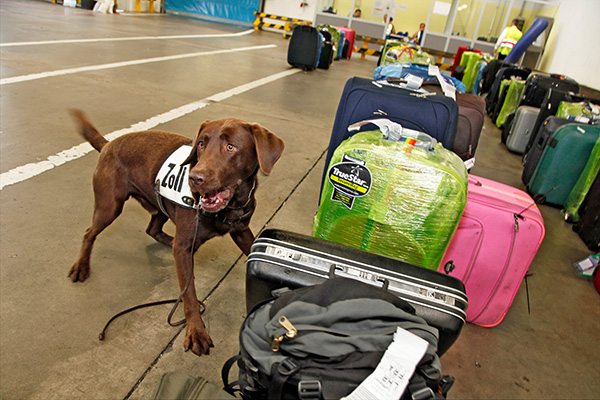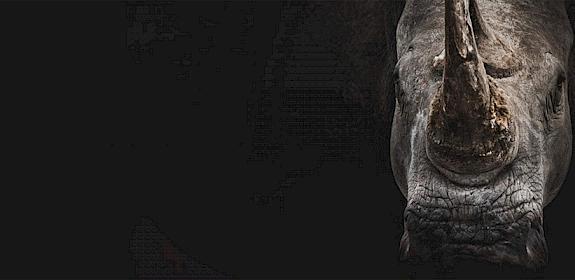Detector dog champion wins prestigious award
Stuttgart, Germany, 27th February 2017—Birgit Braun has won a prestigious award in recognition of her work through TRAFFIC and WWF promoting the use of detector dogs in detecting wildlife trafficking.
Braun was one of three recent Yves Rocher Fondation award winners in Germany in 2017, all women selected for their outstanding contribution towards making a positive footprint on the planet.
Braun’s work promoting the use of detector dogs (also known as sniffer dogs) began during her time at WWF Germany when, in 2004, she was seeking a project to carry out as part of her Master’s thesis. Roland Melisch, then also with WWF Germany, now TRAFFIC’s Senior Director for Africa and Europe, suggested she looked at a TRAFFIC study examining the feasibility of using detector dogs to locate wildlife parts and determine whether there was any scope to introduce the technique in Germany.
Initial trials began at Frankfurt airport, where wildlife parts were concealed in suitcases and trained drug detector dogs encouraged to examine them.
“Although the dogs didn’t react as they had been trained to when they found drugs, their handlers knew from the animals’ reactions, that they had found something of interest in the cases,” recalls Braun.
With the concept now established, Braun set about securing training for dogs to be taught how to find wildlife parts with German Customs. The first working detector dogs entered active service at Frankfurt airport in 2008.
The programme has since expanded, with wildlife detector dogs now active across ten European Union Member States, including Austria, the Czech Republic, Italy, Lithuania and the United Kingdom. Germany currently has eight active dogs, two of them at Frankfurt Airport, the 4th busiest airport in Europe and the 12th busiest worldwide.
In 2013 Braun also coordinated the publication of a joint WWF Germany and TRAFFIC Wildlife Detector Dog manual, which covered the methodology, cost and training necessary for employing sniffer dogs in wildlife crime detection.

There has been interest from a range of agencies involved in regulating trade: the World Customs Organization (WCO), the Convention on Trade in Endangered Species of Wild Fauna and Flora (CITES) and INTERPOL have all recommended the use of detector dogs to detect and deter wildlife trafficking.
Braun has participated in a number of workshops on the use of canines in detecting wildlife trafficking, while in 2011, she was invited to a workshop in China where Customs officials were examining the potential of using sniffer dogs. The first fully wildlife-trained dogs entered service in China in 2013: their training was supported by a TRAFFIC detector dog training programme that was generously funded by WWF Germany and WWF International.
In India, a sniffer dog programme jointly supported by TRAFFIC and WWF-India recently increased the number of detector dogs in service to 27, with one of them, called Jimmy, awarded a Certificate of Merit by the Governor of Madhya Pradesh in 2013 after the dog helped bust at least 25 wildlife poaching and smuggling cases.
Over the years, the detector dogs have made a number of remarkable discoveries. Contraband found by the dogs includes shark fins, corals, caviar and ivory. One of Braun’s favourite stories concerns the finding of sea turtle eggs in a passenger’s luggage at Frankfurt airport. After the eggs were confiscated, they were incubated at Frankfurt Zoo and weeks later, five healthy sea turtle hatchlings flown to the Seychelles, where they were released.
And the potential for using dogs to support conservation efforts doesn’t stop with preventing wildlife crime.
Braun, now Managing Director of Aktionsgemeinschaft Artenschutz (AGA), a German conservation organization, intends to use the money she received from the Yves Rocher Fondation award to support a Cheetah conservation project where dogs have been trained to locate Cheetah scat. Genetic analysis of the scat gives both valuable information about the number and size of local Cheetah populations, as well as their diets: invaluable information if you are trying to find out what impact predation by Cheetahs has on domestic animals.
“Little did I expect when I was handed a TRAFFIC study on the use of sniffer dogs just how far and what an interesting journey it would lead me on,” said Braun.
“Sniffer dogs have already demonstrated their ability to detect crime, but we have only scratched the surface of using dogs to support conservation work world-wide.”




